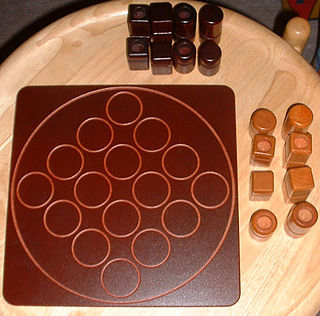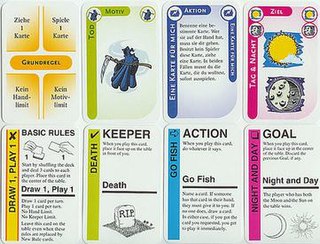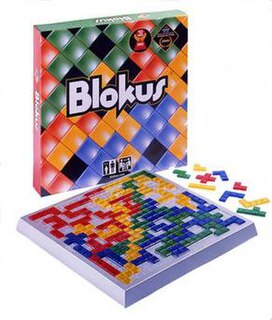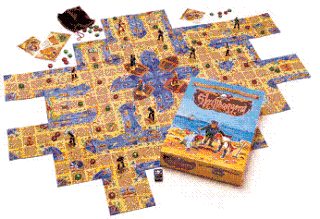Related Research Articles
Scrabble is a word game in which two to four players score points by placing tiles, each bearing a single letter, onto a game board divided into a 15×15 grid of squares. The tiles must form words that, in crossword fashion, read left to right in rows or downward in columns, and be included in a standard dictionary or lexicon.

Quarto is a board game for two players invented by Swiss mathematician Blaise Müller. It is published and copyrighted by Gigamic.

Fluxx is a card game, played with a specially designed deck published by Looney Labs. It is different from most other card games, in that the rules and the conditions for winning are altered throughout the game, via cards played by the players.
Zombies!!! is a tile-based strategy board game for two to six players. Zombies!!! won the 2001 Origins Award for Best Graphic Presentation of a Board Game, and Zombies!!! 3: Mall Walkers won 2003's Origins Award for Best Board Game Expansion.

Blokus is an abstract strategy board game for two to four players, where players try to score points by occupying most of the board with pieces of their colour. It was designed by French mathematician Bernard Tavitian and first released in 2000 by Sekkoïa, a French company. It has won several awards, including the Mensa Select award and the 2004 Teacher's Choice Award. In 2009, the game was sold to Mattel.
I Spy is a children's book series with text written by Jean Marzollo, photographs by Walter Wick, and published by Scholastic Press. Each page contains a photo with objects in it, and the riddles accompanying the photo state which objects have to be found.

Legacy Games is a game publisher of casual titles for mobile devices and retail distribution. Its mobile games consist of match-3 titles such as Atlantis: Pearls of the Deep as well as four Crayola creativity tools, e.g., Crayola DJ. Legacy publishes PC game compilation discs, such as Terrifying Tales, Nancy Drew 2-Pack, and Fantastic Fables for Walmart stores.

Skullduggery, is a children's board game designed to teach basic logic and strategy. It was created and illustrated by Allegra Vernon, Creative Director of Outset Media. The pirate-themed game is played on a tiled board, with tokens representing the players. The game uses pirates and gemstones as enemies to create obstacles, which lends to its name. Each player works to uncover four landmarks in order to complete a treasure map and race to the treasure.

Elizabeth Carpenter is an American writer, fashion designer, maze maker, and board game designer. She lives in New York City where she operates her own business, Mazeology LLP.
Flibbix is a dynamic board game by Merillian for two to five players, in which players build their own game board using magnetic game board tiles, check off custom rules on a "Make your own Rules" sheet, and then play.

Bananagrams is a word game invented by Abraham Nathanson and Rena Nathanson of Cranston, Rhode Island, wherein lettered tiles are used to spell words.

UFO Interactive Games, based in City of Industry, California, is an American publisher of interactive video game content, developing on multiple platforms with a focus on original and mass-market gaming software. As an official third party licensee of Nintendo of America and Sony Computer Entertainment of America, UFO Interactive Games has published numerous titles for the PlayStation 3, Xbox 360, Nintendo DS, Wii, PlayStation 2 and PlayStation Portable consoles.
Luck of the Draw is a drawing game published in 2006. Distinguishing it from other games in the genre, all players draw the same subject and advancement is effected by voting for the most appropriate drawing in various categories rather than guessing a subject. Because the categories are not directly related to artistic skill, players with advanced drawing ability are not favored. The game was conceptualized by Donald W. Scott and is produced under license by Gamewright.

Qwirkle is a tile-based game for two to four players, designed by Susan McKinley Ross and published by MindWare. Qwirkle shares some characteristics with the games Rummikub and Scrabble. It is distributed in Canada by game and puzzle company Outset Media. Qwirkle is considered by MindWare to be its most awarded game of all time. In 2011, Qwirkle won the Spiel des Jahres, widely considered the most prestigious award in the board and card game industry. A sequel, Qwirkle Cubes, was released by Mindware in 2009.
Little Laureate is an American company that produces developmental, multimedia products for small children and their caregivers. It was founded in 2001 by Heather Maclean and Monica Gibson.
Set Cubed is a board game created by Set Enterprises in 2008. Set Cubed is based on the Mensa award-winning card game Set, and challenges a player’s ability to find "sets" by combining the dice in their hand with those already on the board. Set Cubed adds an element of strategy to the visual perception game of Set. It requires players to take turns and speed is eliminated.
Zingo! is a game inspired by Bingo released by ThinkFun in 2002.

Galaxy Trucker is a science-fiction board game for two to four players. The game was developed by Vlaada Chvatil, with graphics designed by Radim Pech. The Czech version of the game was released in 2007 by Czech Games Edition, and a German version was published in the same year by Heidelberger Spieleverlag.

Toca Boca is a Swedish app development studio focused on child-friendly applications for tablets and smartphones. According to the company's website, "We make digital toys and games that help stimulate the imagination." The company is owned by Spin Master and based in Stockholm, Sweden.

Azul is an abstract strategy board game designed by Michael Kiesling and released by Plan B Games in 2017. Based on Portuguese tiles called azulejos, in Azul players collect sets of similarly colored tiles which they place on their player board. When a row is filled, one of the tiles is moved into a square pattern on the right side of the player board, where it garners points depending on where it is placed in relation to other tiles on the board.
References
- ↑ Flibbix Puzzler Page on Apple.com
- ↑ National Parenting Center Gives Flibbix Seal of Approval
- ↑ Parents' Choice gives Flibbix Parents' Choice Silver Honor Award
- ↑ Flibbix wins NAPPA Gold Award
- ↑ Mom's Best Network give Flibbix Mom's Best Award
- ↑ Toy Directory Monthly gives Flibbix Innovations 2008 Award
- ↑ Merillian Press Page
- ↑ TD Monthly's Top 10: Game Zone List
- ↑ Washington Post's "Ready to Play" article
- ↑ About Merillian